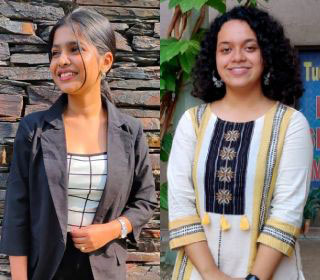Undergraduate Research
Igniting curiosity and a thirst for knowledge
One of NIIT University’s (NU) four core principles is research-driven education. The aim is to ignite their curiosity and spur students to a quest for knowledge.
NU offers research based curricula and many student research projects outside the curricula. Research projects at NU commence in the first year of every undergraduate programme, regardless of discipline.
NU’s undergraduate students are taught to internalise research, so much so they are able to easily spot new phenomena and sense its impact. Project-based learning provides students with research experience in everyday living situations so that every activity in student life becomes a potential research project. This integrative experience of curriculum, community, enquiry and self-learning fosters a transformational change in a student’s ability to carry out research. This inculcates a ‘research temper’ as well as a ‘research career’. Read more
NU offers research based curricula and many student research projects outside the curricula. Research projects at NU commence in the first year of every undergraduate programme, regardless of discipline.
NU’s undergraduate students are taught to internalise research, so much so they are able to easily spot new phenomena and sense its impact. Project-based learning provides students with research experience in everyday living situations so that every activity in student life becomes a potential research project. This integrative experience of curriculum, community, enquiry and self-learning fosters a transformational change in a student’s ability to carry out research. This inculcates a ‘research temper’ as well as a ‘research career’. Read more
Conventionally seen as engagement at postgraduate level, research is often gauged in terms of output such as research papers and conference presentations. At NU, we believe that research is an invaluable tool for training the mind to solve problems. In the ‘information society’ in which we live, problem solving entails collecting information, analysing and interpreting data, then generating new information on the basis of which a student can explore alternate solutions to a given problem. They can then evaluate these alternate solutions to arrive at an optimum solution.
When undergraduate students engage in real-time problem solving by the consistent application of research methodologies using disparate technological tools, they will cultivate a research bend of mind. This early exposure to research not only furthers student interest in academics, but also helps develop a partnership between students and faculty.
While NU thus creates a ‘research culture’, it also provides research opportunities for students who aspire to research as a profession. Through teaching innovations, pedagogical initiatives and curricular innovations, NU encourages students to hone their research capabilities.
When undergraduate students engage in real-time problem solving by the consistent application of research methodologies using disparate technological tools, they will cultivate a research bend of mind. This early exposure to research not only furthers student interest in academics, but also helps develop a partnership between students and faculty.
While NU thus creates a ‘research culture’, it also provides research opportunities for students who aspire to research as a profession. Through teaching innovations, pedagogical initiatives and curricular innovations, NU encourages students to hone their research capabilities.
- Project-based learning: Students work in groups for the entire duration of a semester, from formulating an idea for a real-time project to delivering the product to the actual user. The project may also be part of a lecture-based course where students are required to adopt a research and discovery mode of learning.
The idea behind project-based learning is to:
- Understand the benefits of studying a subject
- Create and maintain student interest in a subject
- Enhance creative learning by learning how to apply their knowledge to solve inter-disciplinary problems
- Develop analytical and presentation skills
- Acquire knowledge
- Understand how and when to use acquired knowledge
- Integrate multi-disciplinary knowledge to solve a problem
- Learn how to learn
- R&D Project: Undergraduate students choose from a multitude of research topics being offered by faculty to narrow down their research of choice. They do the research under the guidance of the faculty over the course of a semester and even after, preparing the literature survey, devising instruments to collect data, collecting and analysing data , and subsequently, presenting their findings to a faculty panel. Interested first learner students can continue their research in the Advanced R&D Project in the following semester.
- Six-month Industry Practice: Students are engaged in a six-month project that offers value to the Industry partner organisation.
- Summer research programme: Students can avail of the opportunity to work on research under faculty guidance. They can present their research at a conference or submit it for publication in academic journals.
- Centre for Incubation Innovation and Entrepreneurship (CIIE): CIIE was created to encourage students to germinate their research ideas into products or services which have the potential to develop into startups.
- NUrap and NUtap: NU’s pioneering programmes provide financial assistance for research activities. NUrap (NU Research Assistantship Programme) is a unique scholarship-based undergraduate research programme that provides students with a monthly scholarship during their summer research project, and even afterwards, if they continue research. NUtap (NU Travel Assistantship Programme) covers expenses towards travel and presenting research papers at conferences.







